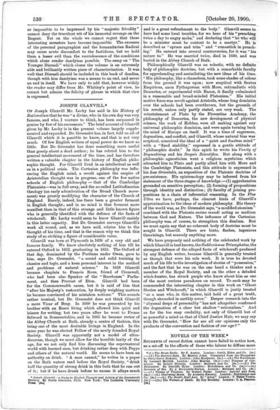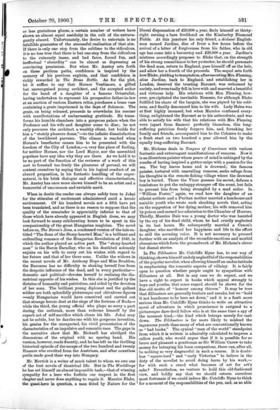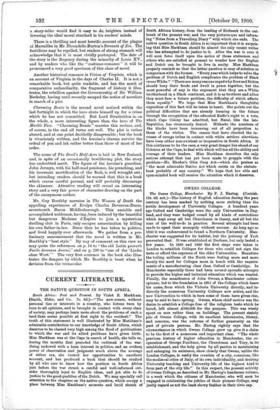NOVELS OF THE WEEK.* STUDENTS of recent fiction cannot have
failed to notice how, as a set-off to the efforts of those who labour to diffuse more
• (1.) The Brass Bottle. By F. Anstey. London : Smith, Elder, and Co. [Ss.] —(2.) The Baron's Sons. By Maurus JokaL Translated from the Hungarian by Percy Favor Bicknell. London : John MacQueen. [68.]—(3.) The Worldling& By Leonard Merrick. London : John Murray. (6s.)—(4.) Tongues of Con- science. By Robert Hichena. London : Methuen and Co. [6s.]—(5.) The Filibusters. By Cutcliffe Hyne. London : Hutchinson and Co. [6s.]—(8.) Servants of Sin. By J. Bloundelle-Burton. London : Methuen and Co. pls.] —(7.) Vivian of Virginia. By Hubert Fuller. London : Jerrold and Sons. [88.]—(8.) Charming Bente. By Arabella Renealy. London : Hutchinson and
Co. [68.]--(9.) The Devils Half-Acre. By " London : T. Fisher Unwin. [6s.]—(10.) The Woman of Death. By Guy Boothby. London : 0. A. Pearson. or less gratuitous gloom, a certain number of writers have shown an almost equal assiduity in the cult of the extrava- gantly absurd. Unfortunately, the desire to entertain is no infallible guarantee of the successful realisation of that aim. If there is only one step from the sublime to the ridiculous, it is no less true that there is but one step from the ridiculous to the ruinously inane, and bad farce, forced fun, and ineffectual " absurdity " can be almost as depressing as convincing pessimism. But when Mr. Anstey sets forth on these perilous paths, confidence is inspired by the memory of his previous exploits, and that confidelice is richly rewarded in The Brass Bottle. As for the plot, let it suffice to say that Horace Ventimore, a gifted but unrecognised young architect, and the accepted suitor for the hand of a daughter of a famous Orientalist, having undertaken to represent his prospective father-in-law at an auction of various Eastern relics, purchases a brass vase containing a genie imprisoned in the days of Solomon. The genie, on being released, proceeds to overwhelm his rescuer with manifestations of embarrassing gratitude. He trawl- forms his humble chambers into a gorgeous palace when the Professor and his wife and daughter come to dine ; he not only procures the architect a wealthy client, but builds for him a" stately pleasure dome,"—to the infinite dissatisfaction of the bewildered parvenu. The climax is reached when Horace's benefactor causes him to be presented with the freedom of the City of London,—a very fine piece of fooling, for neither Horace, nor the Lord Mayor, nor the assembled populace have any idea why they are there. As we hold it to be no part of the function of the reviewer of a work of this sort to forestall too freely the pleasures of perusal, we will content ourselves by saying that in his logical conduct of an absurd proposition, in his fantastic handling of the super- natural, in his brisk dialogue and effective characterisation, Mr. Anstey has once more shown himself to be an artist and a humomist of uncommon and enviable merit.
When in doubt the reader can always safely turn to Jokai for the stimulus of excitement administered amid a heroic environment. Of his hundred novels not a fifth have yet been translated, and as there is no reason to suppose that the quality of the remainder is appreciably inferior to that of those which have already appeared in English dress, we may look forward to many exhilarating hours to be spent in the companionship of the great Hungarian magician. The novel before us, The Baron's Sans, a condensed version of the tale en- titled "The Sons of the Stony-hearted Man," is a brilliant and enthralling romance of the Hungarian Revolution of 1848, in which the author played an active part. The "stony-hearted man" is the Baron Baradlay, who on his deathbed solemnly enjoins on his wife to carry out his wishes .with regard to her future and that of her three sons. Unlike the widows in the recent novels of Mr. Anthony Hope and Miss Braddon, the Baroness has no difficulty in shaking herself free from the despotic influence of the dead, and in every particular— domestic and political—devotes herself to realising the dia- metrical opposite of his wishes. In this she is justified by the dictates of humanity and patriotism, and aided by the devotion of her sons. The brilliant young diplomat and the gallant soldier are both splendidly picturesque and chivalrous figures —only Hungarians would have conceived and carried out that strange heroic duel at the siege of the fortress of Buda— while the third, the young official who plays so sorry a part during the outbreak, more than redeems himself by the superb act of self-sacrifice which closes his life. Jokai may not be subtle, but he dazzles one with his gorgeous invention, his genius for the unexpected, his vivid presentation of the characteristics of an impulsive and romantic race. The gaps in the narrative show that Mr. Bicknell has abridged the dimensions of the original with no sparing hand. His version, however, reads fluently, and he has left us the thrilling historical episode of the escape of the two hundred and twenty Hussars who revolted from the Austrians, and after countless perils made good their way into Hungary.
Mr. Merrick is a writer of much talent to whom we owe one of the best novels of theatrical life. But in The Worldlings he has set himself an almost impossible task,—that of winning sympathy for a hero who forfeits our respect in the first chapter and never does anything to regain it. Maurice Blake, the quasi-hero in question, a man fitted by Nature for the
liberal dispensation of 220,000 a year, finds himself at thirty- eight earning a bare livelihood on the Kimberley Diamond Fields. At this juncture his only friend, a déclassé English- man named Jardine, dies of fever a few hours before the arrival of a letter of forgiveness from his father, who in old age has come into a baronetcy and 220,000 a year. Jardine's mistress accordingly proposes to Blake that, on the strength of his strong resemblance to her protector, he should personate the dead man, return to England, pass himself off as the heir, and allow her a fourth of the proceeds. The sequel sets forth how Blake, yielding to temptation, after escorting Mrs.-Fleming, aliaa Jardine, back to England, and eitablishing her in London, deceived the trusting Baronet, was welcomed by society, and eventually fell in love with and married a beautiful and virtuous lady. His relations with Mrs. Fleming, how- ever, precipitated the inevitable Nemesis, for although Blake fulfilled his share of the bargain, she was piqued by his cold- ness, and finally denounced him to his wife. Lady Helen was at first highly incensed, but when Maurice confessed every- thing, enlightened the Baronet as to his antecedents, and was able to satisfy his wife that his relations with Mrs. Fleming were (apart from finance) perfectly blameless, this long- suffering patrician freely forgave him, and, forsaking her family and friends, accompanied him to the Colonies to make a fresh start on two hundred a year allowed him by the equally long-suffering Baronet.
Mr. Hichens deals in Tongues of Conscience with various fantastic and extravagant manifestations of remorse. Now it is an illustrious painter whose peace of mind is unhinged by the results of having inspired a gutter-snipe with a passion for the sea. The boy leaves home and is drowned; the famous painter, tortured with unavailing remorse, seeks refuge from his thoughts in the remote fishing village where the drowned boy is buried. There the Vicar guesses his secret, defaces a tombstone to put the unhappy stranger off the scent, but fails to prevent him from being strangled by a mad sailor. In , "William Foster," again, we read how the daughter of an atheist testhete and a Puritan mother married a handsome and amiable youth who wrote such shocking novels that, acting on the suggestion of her dying mother, his wife removed him by poison and earned her admission to the Chamber of Horrors. Thirdly, Maurice Dale was a young doctor who was haunted by the cry of his dead child, whom he had cruelly neglected in its last hours. He subsequently married a Canon's daughter, who sacrificed her happiness and life in the effort to still the accusing voice. It is not necessary to proceed further with an analysis of the recondite emotions and morbid obsessions which form the groundwork of Mr. Hichene's clever but dismal stories.
In The Filibusters Mr. Cutcliffe Hyne has, to our way of thinking, shown himself unduly neglectful of the responsibilities of the popular novelist, when allowing himself an undue latitude in emphasising the romantic aspects of villainy. It is fairly open to question whether people ought to sympathise with filibusters at all. But in any case we do expect, and we have a right to expect in books which appeal strongly to boys and youths, that some regard should be shown for the fine old motto of "honour among thieves." It may be true that filibusters are generally traitors and sneaks, but we "hold it not handsome to be here set down," and it is a fault more serious than Mr. Cutcliffe Hyne thinks to write an attractive novel of adventure in which prominence is assigned to a picturesque dare-devil fellow who is at the same time a spy of the meanest kind,—the kind which betrays merely for cash down. The Filibusters is far more likely to mislead the ingenuous youth than many of what are conventionally known as "bad books." The cynical "man of the world" standpoint from which it is written is admirably calculated to impress a callow youth, who would argue that if it is possible for so brave and pleasant a gentleman as Sir William Carew to take money for betraying his boon companions, there can, after all, be nothing so very disgraceful in such a course. It is doubt- less "square-toed" and "early Victorian" to believe in the duty of the novelist to avoid doing harm by his work,— for with such a creed what becomes of art for art's sake ? Nevertheless, we venture to bold this old-fashioned view, and boldly say that we should esteem ourselves most fortunate if we could induce Mr. Cutcliffe Hyne to think for a moment of the responsibilities of the pen, and, as so able a story-teller would find it easy to do, heighten instead of lowering the ideal moral standard in his readers' minds.
There is a thrilling and most horrific account of the plague at Marseilles in Mr. Bloundelle-Burton's Servants of Sin. The fastidious may be repelled, but readers of strong stomach will acknowledge that it is most vividly portrayed. The date of the story is the Regency during the minority of Louis XV., and by readers who like the " costume-romance " it will be pronounced a very good specimen of this class of novel.
Another historical romance is Vivian of Virginia, which is an account of Virginia in the days of Charles II. It is not a remarkable book, but quite readable, and has the merit of comparative unfamiliarity, the fragment of history it illus- trates, the rebellion against the Governorship of Sir William Berkeley, having until recently escaped the notice of novelists in search of a plot.
Charming Renee is the second novel noticed within the last fortnight in which the hero shuts himself up for a crime which he has not committed. But Lord Stratheldon is, on the whole, a more interesting figure than the hero of The Marble Face. "Charming Renee" marries this recluse, and, of course, in the end all turns out well. The plot is rather absurd, and at one point decidedly disagreeable ; but the book is vivaciously written, and the heroine's charms survive the ordeal of pen and ink rather better than those of most of her order.
The scene of The Devil's Half-Acre is laid in New Zealand, and, in spite of an occasionally bewildering plot, the story has undoubted merit. The figure of the heroine's guardian, John Jermyn, with his half-mad penitence, his preaching, and his incessant mortification of the flesh, is well wrought out ; but intending readers should be warned that this is a book which craves careful perusal, and will probably discourage the skimmer. Attentive reading will reveal an interesting story and a very fair power of character-drawing on the part of the anonymous author.
Mr. Guy Boothby narrates in The Woman of Death the appalling experiences of Evelyn Charles Devereux-Ducie, seventeenth Baron Middlesborough. This amiable and accomplished nobleman, having ibeen induced by the beautiful but dangerous Madame d'Espere to join a mysterious duelling club in Paris, only escapes assassination by killing his own father-in-law. Since then he has taken to politics, and lived happily ever afterwards. We gather from a pre- liminary announcement that the novel is written in Mr. Boothby's "best style." By way of comment on this view we may quote the references on p. 14 to "the old Latin proverb Facile decensus Averni," and on p. 280 to "one of the `Lieder ohne Wort.' " The very first sentence in the book also illus- trates the dangers by which Mr. Boothby is beset when he deviates from the vernacular.








































 Previous page
Previous page